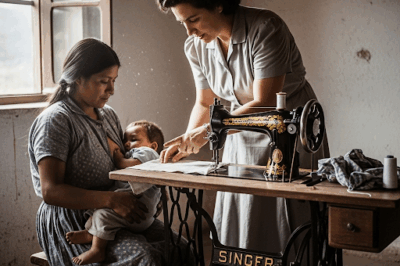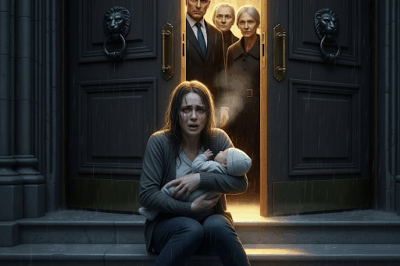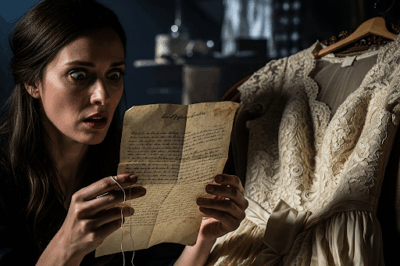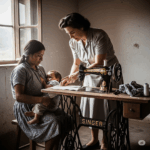Chapter 1: Arrival
The rain had begun its slow assault on the Whittaker estate an hour before dawn, a gentle patter that hinted at a coming storm. Belinda Johnson watched the mansion’s silhouette emerge through the misted windshield of her taxi, its many windows black as shuttered eyes. Somewhere behind that stone façade lived three boys whose reputations had traveled farther than most fairy-tale monsters.
“Last stop,” the driver muttered, clearly eager to leave. Belinda paid, stepped out, and the iron gates groaned shut behind her with a finality that felt almost theatrical.
Seventeen, she reminded herself, tracing the number across her palm like a sigil. Seventeen nannies had walked—or run—through those same gates in half a year. Some had lasted days, one had fled before nightfall, all had whispered the same words on their way out: Impossible. Possessed. Demon children.
Belinda had read every article, every leaked resignation email. Yet the harsher the stories grew, the more a quiet certainty had bloomed inside her: pain leaves fingerprints; I know their pattern.
She crossed the courtyard, rain tapping a nervous code on her umbrella. Somewhere above, lightning flickered, and for a heartbeat she glimpsed her own reflection in a window: rain-matted curls, calm eyes hiding a private ache. A perfect stranger, she thought, walking into a stranger storm.
Just inside the foyer a grandfather clock tolled six. The sound echoed through polished corridors lined with portraits—oils of long-dead Whittakers gazing down with ghostly pride. Belinda inhaled the scent of lemon polish and something faintly burnt. Already awake, she guessed.
A crash rang out, followed by high-pitched laughter and the unmistakable flutter of feathers. A maid hurried past clutching a dustpan, terror sketched across her face. “You’re the new one?” she gasped. Belinda nodded. “God help you,” the maid whispered before scurrying away.
Belinda followed the chaos, soft soles silent on marble. At the threshold of the drawing room she paused, invisible for a moment that felt oddly sacred.
Three identical boys stood amid wreckage: overturned armchairs, shredded pillows snowing white down on Persian rugs. One brandished a fireplace poker like a knight’s sword; another wore a feathered lampshade as a crown; the third balanced on the piano bench, hands smeared crimson—spilled paint, not blood, though the effect was startling.
“They sent another one,” Crown-Boy sneered. “Bet she screams louder than the last.”
“She’s gonna run,” declared Poker-Knight, thumping the floor for punctuation.
Belinda stepped forward at last, rain still sparkling on her coat. “Run? In these shoes?” she asked lightly, lifting a boot as though considering it. “Too slippery. I’d rather stay and watch the show.”
The trio froze, confusion flitting across their faces. Piano-Perch cocked his head. “You’re not angry?”
“Should I be?” Belinda’s voice was soft but carried like distant thunder. She surveyed the room, then knelt to eye level. “Looks to me like you’re building something. May I watch?”
Poker-Knight lowered his weapon a fraction. Crown-Boy’s mouth opened, closed. Piano-Perch slid to the floor, curiosity winning over bluster.
Somewhere deep in the mansion, another clock chimed—a subtle reminder that time, like storm clouds, was always moving. Belinda offered a small, rain-damp smile. Whatever hurricane of grief had torn through these boys’ hearts, she was stepping into its eye now, unflinching.
Outside, thunder rolled closer. Inside, three pairs of wary blue eyes tracked the stranger who didn’t flinch, who didn’t scold, who didn’t call them names.
And in that charged hush before the next crash, an invisible line was drawn—between all the endings that had come before and the beginning that no one, not even the mansion’s brooding portraits, had dared to imagine.
Chapter 2: Ghosts and Games
The first morning passed in a blur of chaos and cautious truce. Belinda watched the boys, noting the way they orbited each other—never quite touching, always bristling with energy. She didn’t try to impose order. Instead, she sat on the edge of a ruined armchair and asked, “Do you need help cleaning up?”
Poker-Knight—whose real name, she soon learned, was Jasper—snorted. “You’re weird.”
Crown-Boy, Oliver, eyed her warily. “We break things. You’re supposed to yell.”
Piano-Perch, Henry, looked at her with something like hope. “Will you stay if we clean?”
Belinda shrugged. “I’ll stay if you want me to. But you don’t have to clean for me. Clean for yourselves.”
It was a simple statement, but it landed like a stone in a pond. The boys exchanged glances, then began to pick up feathers and cushions, grumbling but working together. Belinda joined them, quietly, never taking charge but always present.
By noon, the room was restored. The boys vanished to their wing, leaving Belinda alone with her thoughts and the echoing silence of the house.
She wandered the halls, memorizing the layout, studying the portraits. She paused before one—a woman with stern eyes and a gentle smile. The brass plate read, “Eleanor Whittaker, 1922–1981.” Belinda traced the name, feeling a strange kinship.
Lunch was a quiet affair. The cook, Mrs. Beale, set out sandwiches and soup. The boys appeared, wary but hungry. Belinda ate with them, not speaking unless spoken to. When Henry spilled his milk, she simply handed him a napkin.
Afterward, she found herself in the library. The rain beat steadily against the windows. She ran her fingers along the spines of books, remembering the libraries of her own childhood—a refuge from storms both inside and out.
The boys crept in, drawn by curiosity. Jasper asked, “Why are you here?”
Belinda hesitated, then answered honestly. “I came because I heard you needed someone. Because I know what it’s like to need someone.”
Oliver frowned. “What happened to you?”
Belinda met his gaze. “I lost people. I got hurt. But I learned that pain doesn’t last forever. Sometimes, it teaches us how to love better.”
A silence settled, heavy but not uncomfortable. Henry broke it with a whisper. “Will you read to us?”
Belinda smiled and pulled a book from the shelf. The boys gathered around, listening as she read, their defenses lowering with each page.
Chapter 3: The Haunted Past
Belinda’s own story was a tapestry of loss and resilience. Orphaned young, she’d bounced through foster homes, each more temporary than the last. She’d learned early to read the signs of pain—the clenched jaw, the quick temper, the longing for connection hidden behind bravado.
Her haunted past was not something she spoke of often, but in the quiet hours after the boys slept, she sat by her window and let memories surface. She remembered her mother’s lullabies, her father’s laughter, the way her world had shattered and reformed, piece by piece.
She had become a nanny because she wanted to offer what she’d once needed: stability, kindness, the promise that someone would stay.
The Whittaker boys, she realized, were not monsters. They were survivors—of neglect, of grief, of the impossible expectations placed on children born into wealth and loneliness.
Chapter 4: Breaking the Pattern
Days passed. The boys tested her, pushing boundaries, inventing new chaos. Belinda responded with patience, never raising her voice, never retreating. She set gentle routines—breakfast together, story time, walks in the garden when the rain relented.
She taught them small things: how to fold clothes, how to bake bread, how to apologize and forgive. She listened when they spoke, even when their words were angry or broken.
Gradually, the storms inside the mansion began to ease. The boys argued less, laughed more. They started to confide in her—first in small ways, then in torrents.
Jasper confessed his nightmares. Oliver admitted he missed their parents, though he’d never say it aloud. Henry showed her a box of treasures—letters, photos, scraps of memory.
Belinda shared her own stories, not all at once, but enough to let them know that she understood. She told them about the foster homes, about the loneliness, about the way she’d learned to trust again.
One evening, as thunder rattled the windows, Jasper asked, “Why didn’t you leave?”
Belinda looked at him, her eyes kind. “Because I promised myself I’d never run from pain again. And because I care about you. All of you.”
The boys were silent, absorbing the truth. For the first time, Belinda saw hope flicker in their eyes.
Chapter 5: Restoration
Spring arrived, and with it, the slow restoration of the Whittaker estate. The gardens bloomed, the house filled with sunlight. The boys grew—taller, braver, gentler.
Belinda watched as they learned to trust each other, to trust her. She helped them write letters to their parents, who were often away on business. She organized birthday parties, celebrated small victories, comforted them in defeat.
The staff, once fearful, grew fond of her. Mrs. Beale baked her favorite pies. The gardener taught her how to prune roses. Even the stern butler, Mr. Finch, smiled occasionally.
News of the transformation spread. The story of the “impossible” Whittaker triplets and their unflappable nanny became legend. Reporters called, but Belinda refused interviews. “This isn’t a fairy tale,” she said. “It’s just love, and a little patience.”
Chapter 6: Faith Restored
One night, as rain tapped gently on the roof, the boys gathered in Belinda’s room. Jasper spoke first. “We’re glad you stayed.”
Oliver nodded. “We’re not monsters.”
Henry whispered, “Do you love us?”
Belinda hugged them close. “With all my heart.”
The boys cried, and so did she. The storm outside faded, replaced by the quiet peace of belonging.
Years passed. The boys grew into kind, confident young men. Belinda remained part of their lives, a constant source of love and wisdom.
And the Whittaker estate, once haunted by grief, became a place of laughter, hope, and healing.
Epilogue: The Beginning
Seventeen nannies had come and gone, chased away by pain they couldn’t bear. But one woman with a haunted past stepped through the door and stayed.
What happened next restored everyone’s faith in love—and left the world speechless.
Because sometimes, the greatest storms bring the brightest dawns. And sometimes, the stranger who walks into the storm is the one who teaches us how to heal.
The End
News
La postal del sacrificio: María Dolores y Guadalupe
Capítulo 1: Un instante eterno La luz de la mañana se filtraba suavemente por la ventana de la pequeña aula…
A Seat in the Sky
The tension in the executive class cabin was palpable, like an invisible thread stretched taut between the plush seats and…
La lluvia caía implacable, como un juicio desde los cielos, mientras Claire se aferraba a su recién nacido en los fríos escalones de mármol de la mansión Whitmore.
Capítulo 1: La caída La lluvia caía implacable, como un juicio desde los cielos, mientras Claire se aferraba a su…
El vestido prestado
Capítulo 1: El peso invisible La primera vez que vi el vestido de novia en la boutique vintage del centro,…
Cinco Minutos para el Desastre
Era una tarde gris de miércoles y la lluvia acababa de empezar a caer sobre un tranquilo tramo de la…
Five Minutes to Disaster
It was a gray Wednesday afternoon, and the rain had just started to fall over a quiet stretch of Highway…
End of content
No more pages to load












